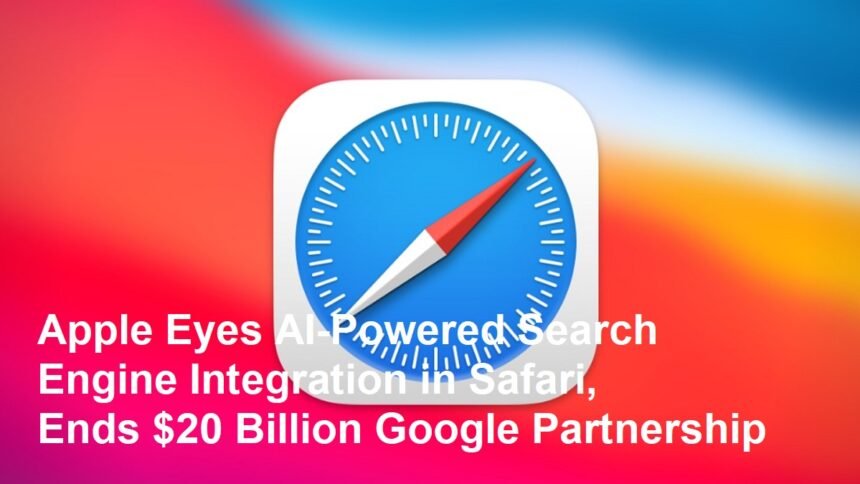On May 10, 2025, reports emerged that Apple is planning to end its longstanding partnership with Google, a deal valued at approximately 20 billion US dollars annually, to become the default search engine provider on Apple devices. Instead, Apple is reportedly shifting its focus toward collaborating with AI-driven competitors such as OpenAI and Perplexity to develop and integrate a new AI-powered search engine directly into its Safari browser. This strategic move signals Apple’s ambition to challenge Google’s dominance in the search engine market by leveraging cutting-edge artificial intelligence technologies to enhance user experience and redefine how users interact with search on Apple platforms.
Background: The Apple-Google Partnership
For over a decade, Google has been the default search engine on Apple’s Safari browser across iPhones, iPads, and Mac computers. This partnership has been highly lucrative for both companies, with Google reportedly paying Apple billions of dollars annually to maintain this privileged position. The arrangement has been a cornerstone of Google’s dominance in the search market, funneling a vast amount of traffic and advertising revenue to the company. For Apple, the deal has been a significant source of income, helping to offset the costs of its hardware and software ecosystem.
However, the technology landscape is rapidly evolving, especially with the rise of artificial intelligence transforming how users search for and consume information. Apple’s reported decision to end this partnership reflects a strategic pivot to reduce reliance on Google and to innovate independently in the AI search space.
Why Apple is Shifting Toward AI-Powered Search
The emergence of AI-powered search engines like OpenAI’s models and Perplexity has revolutionized the traditional search experience. Unlike conventional keyword-based search engines, AI-driven platforms offer conversational, context-aware, and interactive responses that can understand complex queries and provide detailed, nuanced answers. This shift aligns with changing user expectations for more intuitive and personalized digital experiences.
Apple’s interest in integrating AI search engines into Safari is motivated by several factors:
- Enhancing User Experience: By embedding AI capabilities directly into Safari, Apple aims to offer users a more seamless and intelligent search experience that goes beyond simple link retrieval to delivering comprehensive, conversational answers.
- Reducing Dependency on Google: Ending the Google deal allows Apple to regain control over a critical aspect of its ecosystem, reducing reliance on a direct competitor and opening opportunities to innovate on its own terms.
- Strategic Positioning in AI: Partnering with AI leaders like OpenAI and Perplexity positions Apple at the forefront of AI innovation, enabling it to compete effectively in a market increasingly shaped by artificial intelligence.
- Monetization and Data Control: Developing its own AI search engine could allow Apple to explore new revenue models and maintain tighter control over user data and privacy, areas where Apple has historically emphasized strong protections.
Potential Impact on the Search Engine Market
Apple’s move to develop an AI-based search engine integrated into Safari could significantly disrupt the current search engine landscape. Google’s dominance, built over years of technological development and massive data accumulation, faces a new challenger that combines Apple’s vast user base with advanced AI capabilities.
The reported termination of the $20 billion deal would also have financial implications for both companies. Google stands to lose a substantial portion of its search traffic and associated advertising revenue, while Apple may initially face the challenge of building and scaling a competitive search platform.
Moreover, this shift could accelerate innovation in AI search technologies, prompting Google and other competitors to enhance their offerings to maintain market share. The competition may lead to better products and services for consumers, with more personalized, efficient, and privacy-conscious search experiences.
Role of OpenAI and Perplexity
OpenAI, known for its advanced language models and AI research, and Perplexity, an emerging AI-powered search engine, are at the center of Apple’s reported strategy. Collaborating with these companies allows Apple to leverage state-of-the-art AI technologies without building everything from scratch.
OpenAI’s models, such as the GPT series, have demonstrated remarkable capabilities in understanding and generating human-like text, making them ideal for powering conversational search interfaces. Perplexity, similarly, offers AI-driven search solutions that emphasize context and user engagement.
By integrating these AI engines into Safari, Apple can offer users a next-generation search experience that is more interactive, contextually aware, and capable of handling complex queries naturally.
Challenges and Considerations
While the potential benefits are significant, Apple faces several challenges in this transition:
- Technical Integration: Seamlessly embedding AI search engines into Safari requires sophisticated engineering to ensure speed, accuracy, and reliability.
- User Adoption: Convincing users to switch from Google’s familiar search experience to a new AI-powered alternative will require clear advantages and effective communication.
- Privacy and Security: Apple must maintain its strong privacy standards while handling search data, balancing personalization with user trust.
- Competitive Response: Google and other search providers are likely to respond aggressively, investing further in AI and user experience enhancements.
Conclusion
Apple’s reported decision to end its $20 billion partnership with Google and pivot toward AI-powered search engines like OpenAI and Perplexity marks a bold strategic shift in the technology landscape. By aiming to build an AI-driven search engine integrated into Safari, Apple seeks to redefine the search experience for its users, reduce dependency on competitors, and position itself as a leader in the rapidly evolving AI domain.
This move has far-reaching implications for the search engine market, potentially disrupting Google’s dominance and accelerating innovation across the industry. As Apple embarks on this ambitious journey, the coming months and years will be critical in determining how successfully it can leverage AI to transform search and compete in one of the most important arenas of digital technology.









